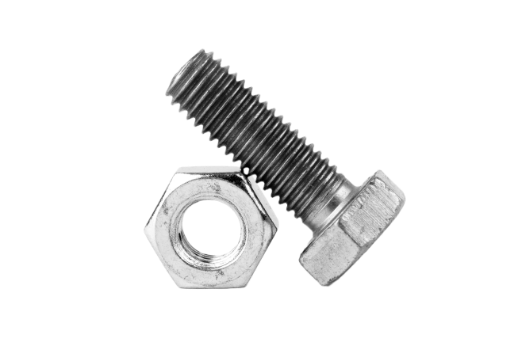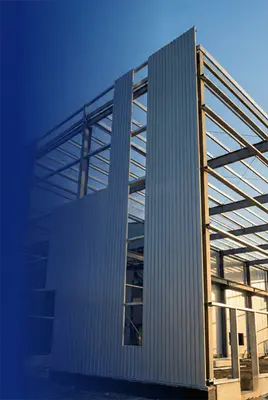
After all, are carbon steel screws rust proof?
That’s the topic and question this article explores: whether or not carbon steel screws are rust-resistant.
If you want to know the answer—and know how carbon steel screws compare to other screw materials—keep reading and we’ll let you know.
Detailed Properties of Carbon Steel Screws
Here are a few of the most important properties of carbon steel screws:
Definition and Composition
Carbon steel is an alloy that is primarily composed of iron and carbon. It is known for its high carbon content, which distinguishes it from other types of steel.
This composition grants carbon steel its notable hardness and strength, which makes it a preferred choice in various industrial and construction applications because of its cost-effectiveness.
Key Characteristics
The inherent strength and affordability of carbon steel makes it an attractive option for manufacturing screws. However, these screws are generally more susceptible to rust compared to their stainless steel counterparts, which includes chromium that offers enhanced corrosion resistance.
Understanding Corrosion Resistance in Carbon Steel
Inherent Susceptibility
Carbon steel's vulnerability to rust is primarily due to its lack of corrosion-resistant elements. When exposed to moisture and environmental elements, carbon steel can quickly begin to corrode, which can lead to potential structural failures if not properly managed.
Environmental Impact
The rate of corrosion in carbon steel screws can also accelerate in humid climates or in environments with high exposure to corrosive chemicals. This susceptibility requires careful consideration of the screw material when planning construction projects or outdoor installations.
Comparing Carbon Steel and Stainless Steel Screws
Understanding the detailed chemical compositions and resulting properties of carbon steel and stainless steel is essential for determining their applicability in various environments. For example:
Composition and Properties of Carbon Steel
Carbon steel is an alloy of iron and carbon, typically containing 0.1% to 2.1% carbon. This range directly affects the steel's hardness and strength, with lower carbon content that provides more ductility and higher carbon increased strength and hardness, but reduced flexibility. Medium carbon steel, with about 0.3% to 0.6% carbon, is often used for screws due to its optimal balance of strength and ductility.
Corrosion Resistance of Stainless Steel
Stainless steel is known for its corrosion resistance, thanks to a minimum of 10.5% chromium content, which forms a protective oxide layer that shields the iron base from rust. Common grades like 304 and 316 stainless steel contain additional elements like nickel and molybdenum that enhance their corrosion resistance. Grade 304 is suitable for most environments, while Grade 316 is better for highly corrosive settings due to its molybdenum content.
Performance Comparison
- Tensile Strength: Carbon steel usually has a higher tensile strength than stainless steel that makes it suitable for load-bearing applications.
- Corrosion Resistance: Stainless steel excels in environments prone to corrosion, so it is ideal for use in marine or chemically aggressive conditions.
- Cost: Carbon steel fasteners are generally more cost-effective than those made from stainless steel due to the lower cost of raw materials.
This comparison provides a clear framework for choosing between carbon steel and stainless steel based on specific project requirements, and balancing performance needs against environmental conditions and budget.
Enhancing Rust Resistance in Carbon Steel
Coating Options
Several coatings and treatments are available to improve the rust resistance of carbon steel screws, including galvanization, which involves applying a protective layer of zinc, and powder coating that provides a durable and protective finish. Each method extends the life of carbon steel screws by providing a barrier against environmental elements.
Effectiveness and Limitations
While coatings can significantly enhance rust resistance, they are not foolproof. The effectiveness of these treatments can vary based on the quality of application and the environmental conditions to which the screws are exposed. Regular maintenance and inspections are recommended to ensure the longevity of the coated screws.
Practical Applications and Recommendations
Suitable Applications
Carbon steel screws are best used in applications where high strength is required and environmental conditions are controlled. They are commonly used in dry indoor settings or in applications where temporary installations are needed.
Choosing the Right Screw
For projects that involve exposure to moisture or chemicals, selecting screws with appropriate corrosion resistance is crucial. Carbon steel screws treated with protective coatings can be used in some outdoor applications, but stainless steel or other more resistant materials may be necessary for harsh environments.
Innovations In Carbon Steel: Advanced Alloying Techniques
Recent advancements in technology have led to the development of new alloying techniques that significantly enhance the rust-resistance of carbon steel.
By incorporating trace elements such as vanadium and nickel, these modern carbon steels form a more stable and dense protective oxide layer when exposed to environmental factors. This innovation improves their resistance to rust and extends the lifespan of the screws even under harsh conditions.
Discover the Strength of Fastener Systems Carbon Steel Screws
So, are carbon steel screws rust proof? Traditionally, no, but if you find carbon steel screws, like the ones provided from Fastener Systems Inc., that have been treated to be highly rust-resistant, then the answer can be yes!
Contact us today to explore our extensive selection of fasteners and other products that can help you complete your project!

